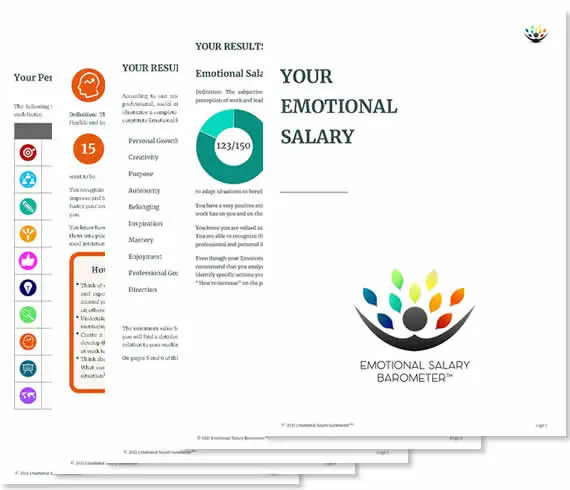Redefining your Work with the Emotional Salary Barometer™
The Emotional Salary Barometer™ is a unique tool that allows you to understand the emotional benefits you are currently getting from your work. These emotional benefits have a huge impact on your motivation, productivity and wellbeing at work. On completion of the Barometer you will receive a personalised report and action plan with information that will enable you to improve your working life immediately.

What the Emotional Salary Barometer™ will enable you to do
The Emotional Salary Barometer™ will enable you to:
- Become aware of your current Emotional Salary and how it is currently impacting your work
- Know your score in each of the 10 factors that constitute your Emotional Salary
- Recognise the importance you give to each of the factors that constitute Emotional Salary
- Start to recognise situations and relationships which are contributing positively or negatively to your Emotional Salary
- Have tips and advice you can immediately implement to start transforming each of the 10 factors to your benefit
- Recognize things that you need to be aware of in relation to each of the 10 factors.
- Be able to map out the action steps you need to take towards increasing your Emotional Salary and thus, create a positive work life.
Wow, this was so spot on! In reading the different factors, and the ‘benefits’ and ‘things to be aware’ of – wow! Very insightful, and relatable. The process itself was easy and enjoyable – didn’t take too long, wasn’t too dense. Now let’s see what I do with it!

Why the Emotional Salary Barometer™ is for you
You will benefit from the Emotional Salary Barometer™ if:
- You are looking for a way to take ownership and responsibility for your own wellbeing
- You want to generate new ideas to help you achieve your goals in creating a more fulfilling work life.
- You want to start taking small steps to take control of your professional future taking into account the emotional benefits you get from working.
- You need new solutions to the challenges you are facing now.
- You want to develop a new sense of purpose and direction in your work.
- You would benefit from a clear pathway to help you create your desired future.
I have personally taken the test, and would highly recommend everyone to do the same, and learn a thing or two about oneself. Income is important, but there are many other important factors that make for a great job/company. After experiencing how detrimental the lack of emotional salary in a company can be, I would definitely say “yes” to a company that offered the emotional salary. For me independence, room for innovation and creativity, knowledge sharing tick the emotional box.

When to use the Emotional Salary Barometer™
The Emotional Salary Barometer™ can be used any time. It can also be used on an ongoing basis to help you track how changes in your working environment are having an impact on your Emotional Salary. It can help you develop an awareness of what you gain from working that is unique to you, so that you can take a more proactive role in valuing what you have, and identifying opportunities to redefine your work in order to get greater fulfilment.
Who the Emotional Salary Barometer™ is for
The Emotional Salary Barometer™ is designed to be used by anyone working as an employee or a freelancer who:
- Wants to better understand what they deeply value, understand what is missing and where the blind spots are in relation to their work.
- Needs an action plan that will help them with the first step they need to take in order to start to redefine their work.
- Wants to receive a comprehensive report with tangible data, metrics and practical tips to improve their wellbeing at work.
- Wants to understand what might be causing a specific feeling towards their work.
- Wants to start appreciating what they have built in their career, but also to start thinking more objectively about the areas they can still make improvements to, in order to start transforming their work lives.

What is included in the Emotional Salary Barometer™ Report
The Emotional Salary Report includes:
- An overall score for your Emotional Salary together with an explanation of how your current work is being impacted by that score.
- Your Personal Action Plan identifying those factors you need to take immediate action on, which ones you need to observe closely, those where you are on the right track and those which would benefit from a periodic review.
- Your personal score in each of the 10 factors that constitute your Emotional Salary with an explanation of each factor and how it is contributing to your working life.
- Practical tips and advice on each of the 10 factors to enable you to take immediate action to improve your Emotional Salary.
- Things to be aware of in each of the 10 factors so you can identify whether there is anything you are currently doing that might be influencing your Emotional Salary.
I’d like to present my experience and appreciation of the Emotional Salary Barometer™. Firstly, on a personal level, the Barometer managed to reflect very well where I am at this moment in my life. Few tools are so accurate in terms of measuring the professional, personal and work experiences of an individual in their current situation. The advice and questions I received will also enable me to continue my growth in the future. Secondly, I can see the potential as a consultant. The tool helps me to have a valuable conversation with the company, the leader of a team and with the individual. It enables me to guide the company and its leaders to generate greater wellbeing in the team and commitment from employees. With an individual, it is especially valuable to enable you to focus your energy on what can empower you and help you achieve your goals.
